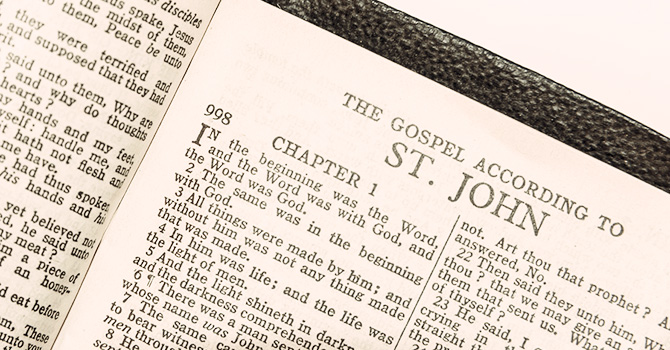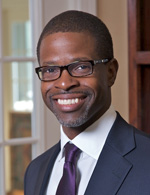Sermon series are a common practice in our congregation. A typical series lasts from three to six weeks, no more.
But in December 2014, I embarked on something far more ambitious: I began preaching for nearly a year on the Gospel of John. With only two or three exceptions, I preached the passages in sequence.
I did not choose to do this on my own; in fact, I’m easily bored with series that last too long. But I was invited to take part in a “commentary of sermons” of the New Testament. Pastors submitted their top five choices from the New Testament to the publisher, who then made the final assignments.
To be honest, my only goal initially was not to end up with Revelation or Philemon. So I was relieved with my assignment.
Right away, I knew I was venturing into new and surprising territory. No doubt, you have heard many sermons from John. So you can imagine how the idea of preaching for more than 30 weeks on John intrigued and intimidated me.
John has lots of complicated twists and turns. It’s one thing to preach about Jesus turning water into wine. It is something else to proclaim the contemporary significance of the Feast of Tabernacles. But since by that time I had signed a contract, I dove in.
The first thing I did was pray. Then I went to the bookstore and purchased as many John commentaries as I could afford. (The last thing I wanted was to go to the local divinity school library and find that a seminarian had checked out all the good John commentaries for an exegesis paper.)
I began the series on the Sunday before Christmas in December 2014. “In the beginning was the Word, and the Word was with God, and the Word was God. … The Word became flesh and made his dwelling among us. We have seen his glory, the glory of the one and only Son, who came from the Father, full of grace and truth” (John 1:1, 14 NIV).
This daunting task proved to be a deeply enriching experience for me and for my congregation. Here are a few of the things I witnessed on the journey:
Preaching is still the most important task of the pastor. In the last 40 years, churches have witnessed dramatic shifts in the way we do ministry, the way we worship and the way we do evangelism. Preaching styles have changed, too. But the attentiveness of the listeners who throughout the series looked forward to hearing what the Johannine Jesus would do next reminded me that the sermon continues to be the fulcrum for discipleship and leadership.
Listeners came to church each week anticipating the next scene of the Jesus story. The benediction was like an intermission between acts. When the call to worship was given, it was as if someone was dimming the lights, reopening the curtains and inviting the actors back on stage to portray the drama of God’s salvation.
At the end of the series, I realized that several visitors had come almost every week to follow the story. We are thankful for the new members who joined our congregation during that time, but those who did not simply confirmed what I already knew. The foolishness of preaching is still wiser than human wisdom.
Reading Scripture changes the way the congregation hears the sermon. In an attempt to keep the series from lasting two years, I made the conscious decision to preach from longer passages as I moved further along in the Gospel.
But we all know how difficult it is to read long passages without the congregation saying to themselves, “When is this going to stop?”
To bring the Scripture to life (“life,” after all, is one of the key words in John; the other is “believe”), we starting reading the passages in multiple voices. We assigned different characters in the text to different readers. We did usually limit the liturgists to three, and we let readers read multiple biblical voices when it was not confusing to do so.
My very modest goal in this exercise was to keep people from falling asleep. So you can imagine my surprise when, after the Scripture reading one Sunday, the congregation erupted in applause!
I shed a tear -- people had not just listened to the text; they had entered into the text. I sat in the pulpit thinking, “We just heard the word of the Lord.”
On one level, this speaks to the clear and compelling way the readers approached their task. It also points to the sheer gift of God’s word. We do not live by bread alone but by every word that comes from the mouth of God.
Reading the Scripture in multiple voices helped listeners engage the sermon in a much richer way. Instead of listening merely for information, the congregation listened for the narrative. They could imagine themselves in the story. The dramatic reading helped listeners feel what the disciples felt and see what Jesus saw. They could pick up on the irony in Jesus’ words and sense the indignation in his voice. Truly, the Word became flesh.
The Word became flesh for me, too. The congregation was not alone in feeling the impact of preaching through John. Living, breathing and eating the Gospel of John for nearly a year took me deeper into biblical understanding and theological interrogation.
Instead of devolving into repetition -- an initial concern of mine -- the series refreshed my preaching by giving me the opportunity to connect subtle threads of the Gospel from week to week.
I am reminded of Søren Kierkegaard’s book “Purity of Heart Is to Will One Thing.” The sense of joy and peace I experienced throughout the series was perhaps because my whole heart was aimed at doing one thing -- preaching John.
I preached the last sermon in the series on September 13, 2015. My text was John 21:15-25, and the sermon title was “Where Do We Go from Here?”
I once read that pastors of a bygone era would “winter” with a book of the Bible when weather severely limited travel. Pastors would set aside six or more hours a day for focused study on a particular biblical book. I see how this practice of going deep rather than wide has its advantages. I was unsure about how the congregation would respond to such an extended series. I was not even sure how I would feel about it. But now I’m sure that I will do it again.
As I think back on this journey, I am grateful for the newness John breathed into our congregation and my preaching. I affirm the words of John 20:30-31: “Jesus performed many other signs in the presence of his disciples, which are not recorded in this book. But these are written that you may believe that Jesus is the Messiah, the Son of God, and that by believing you may have life in his name.”
Glory to the Lamb of God.














